This is the fourteenth and final book in Rachel’s Vonnegut Reading Order. It’s been a pleasure, everyone.
When Rachel said that out of all the novels in the Vonnegut canon, Breakfast of Champions ought to be read last, I was somewhat puzzled. Why should a book written in the middle of Vonnegut’s career come last? Why shouldn’t it be Timequake, his last novel (and, if you ask me – and isn’t this all about asking me? – his most autobiographical)? Rachel explained to me that people would understand the references Breakfast of Champions makes to other Vonnegut books better if they read it last.
I love references. One of my favorite sections in The Odyssey is the one where Odysseus takes that random trip to the Underworld, the one everyone else skips to get to the juicy bloody gory stuff. That scene’s full of Greek mythology references. (Sisyphus? What’s up, man? Tantalus, tell the kids I said hi – oh, wait . . .) So I waited until the end of the Vonnegut lineup to read Breakfast of Champions, just like Rachel told me.
Here is what I think: this is a piece of work. Both in the sense that it is a piece of Kurt Vonnegut’s literary work, and in the sense that it is a piece. Of. Work.
That’s not (necessarily) a bad thing, though. Wasn’t it Mark Twain, a writer much beloved by Kurt and by the United States, who said that his mother had a grand old time dealing with his own piece-of-work-ness? Pieces of work can be a lot more rewarding than just plain old works.
We kind of have three protagonists going here: Dwayne Hoover, a car salesman who is slowly going insane; Kilgore Trout, our favorite oddball sci-fi author; and Kurt Vonnegut, our favorite real-world author. Kurt manipulates Dwayne and Kilgore’s surroundings in random and strange ways – he, as the real author, has the power to make them do whatever he likes. These guys bump into each other and into other people, wondering what on earth has made them all come to this.
Upon my first read of Breakfast of Champions, I wasn’t able to detect many references. But then I consulted a copy of The Vonnegut Encyclopedia, written and compiled by the incomparable Marc Leeds, and realized that there are Vonnegut references galore in this piece of work. There were also references to Breakfast of Champions made in later Vonnegut works. Here are all the links I managed to find:
- Rabo Karabekian, an artist in Breakfast of Champions, is the narrator of Bluebeard, a later book by Vonnegut.
- Francine Pefko, the insane Dwayne Hoover’s secretary and mistress, is also a character in Cat’s Cradle. At least, she’s a female secretary with the same name, but she’s an utterly different character, vapid and uninteresting. I’m still counting this as a reference, though.
- Kilgore Trout, of course! Our old friend Kilgore is in 5 Vonnegut novels: God Bless You, Mr. Rosewater; Slaughterhouse-Five; Breakfast of Champions; Galápagos (by mention); and Timequake.
- Eliot Rosewater, the star of God Bless You, Mr. Rosewater, is tantalizingly mentioned in this book but never actually takes the time to show up.
- Midland City, Ohio, the setting of Deadeye Dick, is a major location in this novel.
- Barrytron Limited, an electronics company in Midland City, is mentioned in this book. It’s also mentioned in Deadeye Dick and Hocus Pocus (the father of the protagonist of Hocus Pocus worked there during World War II).
- Celia Hoover, Dwayne’s deceased wife, actually spans three different Vonnegut novels. She had a fling with James Wait of Galápagos, which produced her son, George; neither George nor Dwayne ever knew that George was illegitimate. Celia is also featured in Deadeye Dick as Celia Hildreth, the beautiful girl that Felix Waltz goes to the prom with. Her marriage and eventual insanity are both mentioned in Deadeye Dick.
That means Breakfast of Champions is tied to at least eight of Kurt’s other novels! Impressive.
I didn’t think I understood anything about this book until I got to the end. And now I think I do. There will be slight spoilers in this section, so if you would rather read the book unencumbered by the burden of knowing the end, I’ll understand if you choose to skip the rest of this blog. But honestly, the end doesn’t have a whole lot to do with the plot, even if it has everything to do with the book.
Kurt says that this book is a fiftieth birthday present for himself, and the theme of doing something you can’t undo or losing someone you can’t get back runs all through the book. For example, Kurt dedicated this book to someone who was kind to him when he was a child. Her name was Phoebe Hurty, and she wrote ads for Block’s department store in Indianapolis. She hired him to write advertising copy about teenage clothes, which he then had to wear. (We have a photo ad of Kurt in a tuxedo in the museum, which we think he wore because of Phoebe’s influence.) Kurt was friends with Phoebe’s sons, and he was often over at her house. She taught him, as he said, the value of being impolite. However, by the time Breakfast of Champions was finished, Phoebe had passed away.
Kurt’s father also died at age seventy, before Kurt became famous, and Kurt often describes Kilgore Trout as looking like his father did when he was an old man. Kurt Vonnegut (the character) decides to set Kilgore Trout free from the bounds of narrative at the end of this novel, giving him autonomy beyond that of the average fictional character. Here is what he says:
I am approaching my fiftieth birthday, Mr. Trout . . . I am cleansing and renewing myself for the very different sorts of years to come. Under similar circumstances, Count Tolstoi freed his serfs. Thomas Jefferson freed his slaves. I am going to set at liberty all the literary characters who have served me so loyally during my writing career.
This entire book is a mid-life crisis. People are realizing that the way they thought the world worked isn’t how it works – in fact, it doesn’t work at all. Relationships are damaged, minds are broken, characters are set free from fiction. And even though Kurt Vonnegut can take Kilgore Trout to the Taj Mahal and back again, the one thing he can’t – or won’t – do is make Kilgore young again.
Or himself.
And that’s why I finished Breakfast of Champions feeling very, very sad, and why I have forced you to sit through the thought process behind my own weepy conclusion, hoping you will feel very, very sad as well.
This is my last reaction to a Vonnegut novel because this is the last Vonnegut novel I have to read. It really has been a pleasure, everyone. If you have strong opinions about anything I have said, please come to the museum and discuss them with me. I adore strong opinions; none of mine are anything else. I look forward to seeing you.

If you want to buy Breakfast of Champions, please click here.



